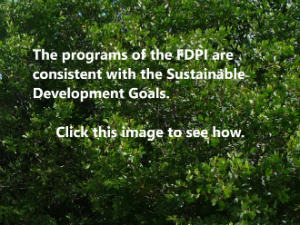By Lloyd Gardner December 1, 2011
One of the supporting elements of environment and development programmes is the establishment of communication and information sharing mechanisms. Such mechanisms have evolved to include professional networks and the use of internet-based communication tools. During the 1980s and 1990s, the establishment of national environmental management agencies, the rapid growth in the number of national and regional civil society organizations, the establishment of regional environment and development inter-governmental organizations, and the globalization of environmental programming resulted in the growth of Caribbean regional environmental information networks (REINs).
In 2002, the Caribbean Conservation Association (CCA) undertook a survey of the REINs in the Caribbean. The survey identified more than 40 networks or environmental information providers, displaying information sharing and communication practices ranging from traditional surface mail to conferences to computer-based information systems.
The survey also identified the following environmental information challenges:
- Information overload existed for certain types of information, and gaps for other types. Information was scattered across various networks, which were generally not connected. Even when available, the usefulness of environmental information was often questionable.
- Although there was increased demand for information and increased use of information resources, users experienced difficulty accessing information relevant to the Caribbean.
- Information networks were generally disconnected from the policy process.
- Many persons had limited access to facilities and web-based technologies. This was particularly problematic for people functioning at the community level, as the lack of facilities reduced their ability to participate in the development process.
- Mass media coverage of environmental issues tended to be focused on the particulars of specific events, while non-media networks often focused on narrow areas of specialized concern.
Compartmentalisation of environmental information and the thematic focus of professional networks resulted primarily from the evolution of regional environmental programming along thematic lines, even though many professionals participate in multiple networks. One of the objectives of the Caribbean Regional Environmental Programme Project (2001-2006) was the improvement of regional environmental information delivery through the development of an integrated REIN. This integrated platform was described as a “strengthened regional, national and local community information and communication systems committed to continuously enhancing access and use of environmental information within the Caribbean through an effective REIN structure, and to demonstrate the benefits of integrating protected areas management with the promotion of sustainable livelihoods”.
The assumption that increased programmatic linkages between regional environmental information networks will improve success in delivery of environment and development initiatives is still valid. As such, the 2002 report prepared by the Caribbean Conservation Association provides the basis for a renewed discussion among Caribbean institutions concerning the potential contribution of regional environmental information networks to the Caribbean development process.
Lloyd Gardner is an environmental planning consultant and President of the Foundation for Development Planning, Inc.

No Comments Yet - be the First!